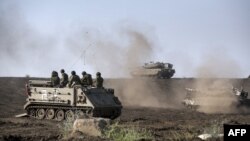JERUSALEM —
Israel has closed its northern airspace to commercial aviation and deployed two batteries of an anti-missile defense system there after a series of reported Israeli air strikes in Syria. A Syrian activist group says the strikes killed at least 42 Syrian soldiers.
Israel's boundaries with Syria and Lebanon were quiet Monday although its security forces were on high alert, one day after the reported attack into Syria.
Security sources in the United States said the targets were advanced weapons that were to be transferred to Lebanon's Hezbollah militant group.
Syria denied the charge. Its information minister, Omran al-Zoubi, read a statement following an emergency Cabinet meeting late Sunday in Damascus calling the attacks a blatant act of aggression.
He said Syria has the right and the responsibility to protect its country and people from any form of infringement at home or abroad.
The French news agency, AFP, quoted unidentified government sources in Damascus Monday as saying that Syria would choose the timing of any retaliation and this might not come immediately.
It was the second attack attributed to Israel inside Syria in three days. One of the targets reportedly was hit in a previous Israeli strike in January.
Israeli officials have refused to comment directly on the reports but Deputy Foreign Minister Ze'ev Elkin told Israeli radio that Israel is worried about Syria's advanced weaponry as the Syrian civil war enters its third year.
He said for a long time Israeli officials have expressed fear over weapons provided to Syria by Iran or other powers. He added that what worries Israeli officials most is the possibility that these weapons could find their way to Hezbollah.
The Israeli newspaper Yediot Aharonot Monday said Israel sent a secret message through diplomatic channels to the Syrian government saying it did not intend to become involved in Syria's civil war.
Israeli parliament member Tzachi Hanegby, who is close to Prime Minister Benjamin Netanyahu, said if there was any Israeli attack, it was against Hezbollah and not Syria.
The former Israeli ambassador to the United States, Itamar Rabinovich, now a Tel Aviv University professor, said Syria's civil war is affecting its neighbors and flooding them with refugees.
Rabinovich said Israel so far has been only marginally affected by the war but this could change in a moment and this moment is getting closer.
Syria's allies, Russia and China, criticized the attack. U.N. Secretary-General Ban Ki-moon and France expressed concern that the Syrian conflict could spread.
U.S. President Barack Obama said Israel is justified in protecting itself from arms shipments to Hezbollah.
Israel's boundaries with Syria and Lebanon were quiet Monday although its security forces were on high alert, one day after the reported attack into Syria.
Security sources in the United States said the targets were advanced weapons that were to be transferred to Lebanon's Hezbollah militant group.
Syria denied the charge. Its information minister, Omran al-Zoubi, read a statement following an emergency Cabinet meeting late Sunday in Damascus calling the attacks a blatant act of aggression.
He said Syria has the right and the responsibility to protect its country and people from any form of infringement at home or abroad.
The French news agency, AFP, quoted unidentified government sources in Damascus Monday as saying that Syria would choose the timing of any retaliation and this might not come immediately.
It was the second attack attributed to Israel inside Syria in three days. One of the targets reportedly was hit in a previous Israeli strike in January.
Israeli officials have refused to comment directly on the reports but Deputy Foreign Minister Ze'ev Elkin told Israeli radio that Israel is worried about Syria's advanced weaponry as the Syrian civil war enters its third year.
He said for a long time Israeli officials have expressed fear over weapons provided to Syria by Iran or other powers. He added that what worries Israeli officials most is the possibility that these weapons could find their way to Hezbollah.
The Israeli newspaper Yediot Aharonot Monday said Israel sent a secret message through diplomatic channels to the Syrian government saying it did not intend to become involved in Syria's civil war.
Israeli parliament member Tzachi Hanegby, who is close to Prime Minister Benjamin Netanyahu, said if there was any Israeli attack, it was against Hezbollah and not Syria.
The former Israeli ambassador to the United States, Itamar Rabinovich, now a Tel Aviv University professor, said Syria's civil war is affecting its neighbors and flooding them with refugees.
Rabinovich said Israel so far has been only marginally affected by the war but this could change in a moment and this moment is getting closer.
Syria's allies, Russia and China, criticized the attack. U.N. Secretary-General Ban Ki-moon and France expressed concern that the Syrian conflict could spread.
U.S. President Barack Obama said Israel is justified in protecting itself from arms shipments to Hezbollah.




